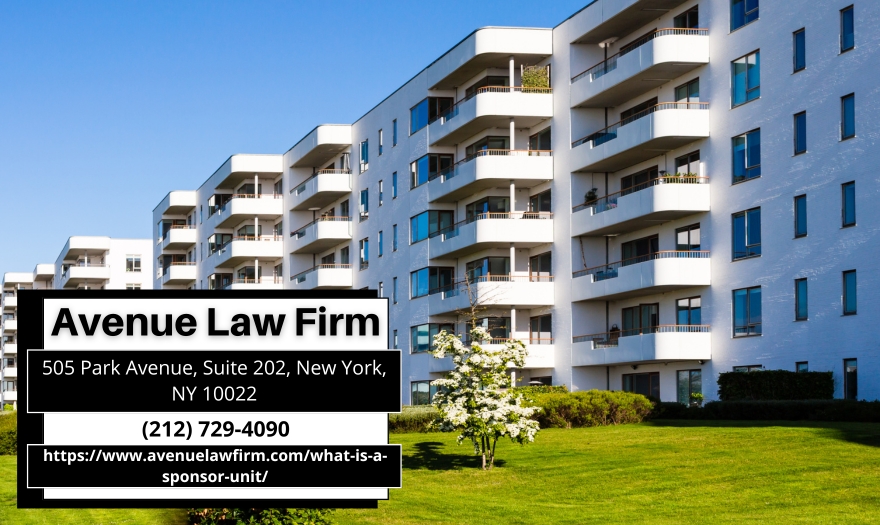New York real estate attorney Peter Zinkovetsky (https://www.avenuelawfirm.com/what-is-a-sponsor-unit/) of Avenue Law Firm has published an article offering clarity on a frequently misunderstood aspect of New York City real estate: sponsor units. For buyers exploring the city’s complicated housing market, sponsor units present both unique opportunities and challenges that require a firm understanding before entering a transaction.
As a New York real estate attorney, Peter Zinkovetsky defines a sponsor unit as a property within a co-op or condo building that has never been sold since the building’s conversion from rental status. These units remain in the control of the building’s original developer or sponsor and are exempt from the standard board approval process typically required in co-op purchases.
“Buyers often find sponsor units attractive because they bypass one of the most stressful steps in New York real estate—the co-op board interview and approval process,” said New York real estate attorney Peter Zinkovetsky. “But there are legal, financial, and logistical considerations that need to be carefully evaluated before making a decision.”
Sponsor units differ from traditional units in several ways. They are usually sold by the original sponsor for the first time, often “as-is,” which may mean they require extensive renovations. While avoiding the co-op board’s scrutiny is a major advantage, buyers should also be aware of elevated closing costs and potential complications, especially if the unit was previously occupied by a rent-stabilized tenant.
Unlike regular co-op units, sponsor units do not require buyers to undergo board interviews or financial screening. This convenience is especially appealing to international buyers, investors, or those with unconventional financial backgrounds. Additionally, down payment requirements may be more flexible, negotiated directly with the sponsor rather than dictated by strict co-op policies.
Sponsor units can also offer more lenient rules during the sale process—such as the ability to sublet more freely—though these freedoms typically end once the unit changes hands and becomes subject to standard building bylaws.
Zinkovetsky also explains the historical context of sponsor units. Many arose during the wave of rental building conversions in the 1970s and 1980s, when rent-stabilized units were offered to tenants at discounted rates to encourage purchase. Units not sold during that time remained sponsor-owned and can only be offered for sale once the tenant vacates.
The article notes several risks associated with buying a sponsor unit. These include potentially high renovation costs, market price premiums despite outdated conditions, and steep closing costs—including New York State and City transfer taxes, which are typically the buyer’s responsibility. Legal complications may also arise if previous tenants’ leases weren’t properly terminated or if there are disputes over occupancy rights.
When buying in a co-op with numerous unsold sponsor units, mortgage approval may become more difficult. Lenders can view high sponsor ownership as a sign of financial risk, leading to stricter lending terms or denials. Zinkovetsky advises buyers to work with a real estate attorney to review offering plans and financial disclosures, which reveal the number of unsold units and help assess the building’s financial health.
Sponsor units can also be desirable for buyers seeking customization. Many are in “estate condition,” offering blank slates for renovations. This presents an opportunity to restore and personalize a home within a historic building—often with original architectural details not found in newer developments.
Still, Zinkovetsky cautions that buyers must weigh these benefits against the additional responsibilities and costs. Legal counsel can help buyers handle due diligence, negotiate favorable terms, and ensure compliance with applicable real estate laws.
About Avenue Law Firm:
Avenue Law Firm, led by New York real estate attorney Peter Zinkovetsky, provides legal services in all areas of New York real estate, including sponsor unit transactions, condominium and co-op purchases, and residential closings. The firm combines deep market knowledge with personalized client service to help New Yorkers make informed, secure property decisions..
Embeds:
Youtube Video: https://www.youtube.com/watch?v=5KUnc6njXTc
GMB: https://www.google.com/maps?cid=14223199020890935024
Email and website
Email: peter@avenuelawfirm.com
Website: https://avenuelawfirm.com/
Media Contact
Company Name: Avenue Law Firm
Contact Person: Peter Zinkovetsky
Email: Send Email
Phone: (212) 729-4090
Address:505 Park Ave Suite 202
City: New York
State: New York 10022
Country: United States
Website: https://avenuelawfirm.com/

